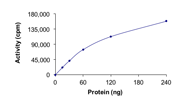
RIPK1, Active(R07-11G)
FOR BULK ORDER REQUESTS PLEASE CONTACT US
Description :Recombinant human RIPK1 (1-327) was expressed by baculovirus in Sf9 insect cells using an N-terminal GST tag.
Species :Human
Tag :GST tag
Expression System:Sf9 insect cells using baculovirus
Sequence :1-327
Genbank Number :NM_003804
Specific Activity :Sample Kinase Activity Plot. For specific information on a given lot, see related technical data sheet.
Purity :Sample Purity Data. For specific information on a given lot, see related technical data sheet.
Storage, Stability, and Shipping :Store product at –70oC. For optimal storage, aliquot target into smaller quantities after centrifugation and store at recommended temperature. For most favorable performance, avoid repeated handling and multiple freeze/thaw cycles.
Applications :Kinase Assay, Western Blot
Molecular Weight :63 kDa
Gene Aliases :RCK; MAP3K19
Scientific Background :RIPK1 or Receptor Interacting Protein Kinase 1 is a serine/threonine kinase that was originally identified as interacting with the cytoplasmic domain of FAS. RIPK1 has been deemed as an important element in the signal transduction machinery that mediates programmed cell death. RIPK1 has been shown to interact with TRADD, TRAF1 TRAF2 and TRAF3 and TRADD can act as an adaptor protein to recruit RIPK1 to the TNFR1 complex in a TNF-dependent process (1). TNFα is capable of activating the noncanonical NF-κB pathway, but this activation of this pathway is negatively regulated by RIPK1 (2).
References :
1. Hsu, H. et al: TNF-dependent recruitment of the protein kinase RIP to the TNF receptor-1 signaling complex. Immunity 4: 387-396, 1996.
2. Kim, J Y. et al: TNFα induced noncanonical NF-κB activation is attenuated by RIP1 through stabilization of TRAF2. J Cell Sci. 2011 Feb 15;124(Pt 4):647-56.
Product Sheets (By Lot #) :
Research Areas :Apoptosis/Autophagy, Cancer, Inflammation, JAK/STAT Pathway, JNK/SAPK Pathway, p38 Pathway, Ser/Thr Kinases
